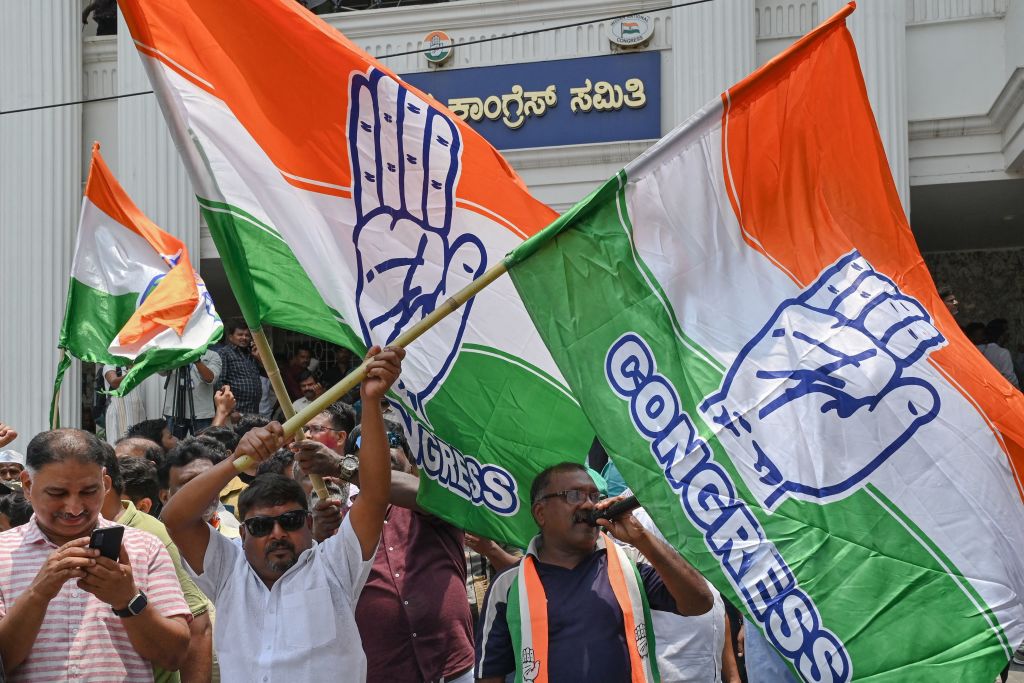
The Congress Party has gained momentum in the southern Indian state of Karnataka after winning a crucial state election against the ruling Bharatiya Janata Party (BJP), led by Prime Minister Narendra Modi. A vote count by the Election Commission revealed that Congress won 135 assembly seats out of 224—well past the majority mark of 113—to form the state government. The BJP had less than 70 seats.
Karnataka is home to 65 million people, including many young professionals who work in its capital city and tech hub of Bangalore. Until now, it was the only state in southern India that was controlled by the BJP. It is the first of five big states to head to the polls this year, and the second state where the BJP has lost to Congress in the last six months after a state election in the northern state of Himachal Pradesh in December.
While defeating the ruling BJP remains an uphill battle for Congress, many analysts see Karnataka as a crucial indicator of the ruling party’s waning popularity ahead of the national election just a year away, when Modi will seek a third consecutive term in office. The BJP saw its stronghold in the state as a crucial stepping stone for its political ambitions in neighboring states like Tamil Nadu, Telangana and Kerala, where it currently has no electoral standing.
More from TIME
Read More: How a Historic March Could Revive India’s Opposition Movement
In Karnataka, the BJP had been in power since 2018 after campaigning on its dominant platform of Hindu-nationalist values that pandered to majority Hindu voters. Analysts say this election result has demonstrated the “limits of Hindutva.” Wrote one columnist in the Hindustan Times, “the BJP made a big pitch for Hindutva to contain the Congress in these elections. The results show that the strategy might have backfired instead of working.”
The BJP had previously maximized its gains by pandering to religious tensions between the majority Hindus and Muslims in the state. (According to the latest census figures from 2011, Karnataka is home to 84% Hindus, 13% Muslims, and less than 2% Christians.) Last year, the government banned Muslim girls from wearing the headscarf as part of their school uniform. In April, it scrapped reserved quotas for Muslims in employment and education and redistributed them to two Hindu caste groups, despite facing opposition in courts.
In the lead-up to the state election, the BJP also campaigned aggressively across Karnataka with Modi holding several rallies and roadshows in a span of 10 days. The party banked on Modi’s popularity as a national leader and accused its opponent of disregarding Hindu values. However, it has seen diminishing returns even amongst the state’s dominant Hindu Lingayat caste, once a strong part of the BJP’s base, which withdrew its support after several old-guard leaders weren’t in the race.
The Congress Party’s local campaign was organized by the state’s leaders, focusing on issues like rising inflation and unemployment, food insecurity, and farmer distress. It also pointed to the allegations of corruption against the BJP-led state government and its failures in building better infrastructure.
“The PM injected divisiveness and attempted polarisation. The vote in Karnataka is for an engine in Bengaluru that will combine economic growth with social harmony,” Jairam Ramesh, the Congress general secretary, wrote on Twitter.
Read More: India’s Opposition Party Says Rahul Gandhi’s Conviction Is ‘Flimsy and Cooked Up’
Earlier this year, Rahul Gandhi, a scion of the Gandhi family that has led the Congress Party for decades since India’s independence, completed a nationwide march called the Bharat Jodo Yatra in an attempt to speak to voters and gain wider electoral support. Gandhi also walked across Karnataka, covering 317 miles over 21 days. Congress subsequently won 15 of the 20 constituencies covered by the march, according to data compiled by The Quint.
Karnataka’s election results have rejuvenated the Congress Party’s prospects in the national elections in 2024 when it will once again challenge Modi’s leadership. In March, Gandhi was ousted from Parliament after charges of defamation were brought against him by the BJP over remarks he made in a previous election rally in 2019 about the Prime Minister’s “Modi” surname. If a court does not overturn his conviction, Gandhi will lose his eligibility to run in the elections.
More Must-Reads From TIME
- What Student Photojournalists Saw at the Campus Protests
- How Far Trump Would Go
- Why Maternity Care Is Underpaid
- Saving Seconds Is Better Than Hours
- Welcome to the Golden Age of Ryan Gosling
- Scientists Are Finding Out Just How Toxic Your Stuff Is
- The 100 Most Influential People of 2024
- Want Weekly Recs on What to Watch, Read, and More? Sign Up for Worth Your Time
Write to Astha Rajvanshi at astha.rajvanshi@time.com